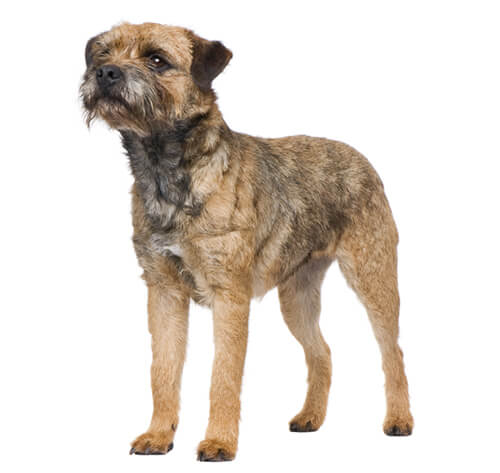
Border Terrier
A persistent worker with great agility and endurance, the Border Terrier was bred in the 18th century to protect farm stock along the border of Scotland and England. An admirable hunter that learns quickly and responds well to obedience training, the breed makes a good-tempered, affectionate family companion. An active dog, the Border Terrier does best with a job and when well-exercised. His water-resistant coat requires regular brushing and biannual stripping.
DID YOU KNOW? Famous Border Terriers in film include “Puffy” from "There's Something About Mary" and “Baxter” from "Anchorman."
The need-to-know
- Dog suitable for non-experienced owners
- Some training required
- Enjoys active walks
- Enjoys walking an hour a day
- Small dog
- Some drool
- Requires grooming every other day
- Non hypoallergenic breed
- Chatty and vocal dog
- Guard dog. Barks and alerts
- May require training to live with other pets
- May require training to live with kids
Personality

The Border Terrier breed is an affectionate, fun-loving one. They are brave, adaptable and good with people, especially with children. Generally easy-going, they have an independent nature and like to make their own decisions. The Border loves to chase rabbits and squirrels but will live in harmony with other household pets, if socialised and introduced carefully. This dog is equally at home in town or country.
The Border Terrier would suit an active owner who loves the ‘big dog in a small body’ attitude of a terrier but who prefers a softer, less feisty - and more social - version.
Nutrition and Feeding

Small dogs have a fast metabolism, meaning they burn energy at a high rate, although their small stomachs mean that they must eat little and often. Small-breed foods are specifically designed with appropriate levels of key nutrients and smaller kibble sizes to suit smaller mouths. This also encourages chewing and improves digestion.
Exercise

The Border Terrier dog breed is very active, bred to follow the hunt and with keen hunting instincts. They need a minimum of an hour's exercise on a daily basis, but will enjoy more. They may chase any small creature that takes their fancy regardless of the situation. This can lead them into trouble, but an owner who is aware of this and starts appropriate training at an early age will find they can be trained to a high standard.
Other Information

History and origins
The Border Terrier dog breed first appeared in the 18th century and has changed little since. They were used as working terriers in the Scottish Borders, hunting foxes which preyed on livestock. They needed to be fast enough to run with the hounds but small enough to flash the fox out of their den. During their history they were known as Reedwater Terriers and Coquetdale Terriers but nowadays are referred to as Border Terriers. They are still occasionally working terriers in the countryside but now are mainly family companions.
Health and common issues
The Border Terrier is generally a very healthy dog. Although there are some breed-associated problems known to exist such as eye disorders and epilepsy, but these are relatively rare.
Space requirements
The Border Terrier can be happy as either an urban or a rural companion as long as they have plenty of exercise, but they enjoy countryside walks and exploring the sights and scents of the great outdoors so they do need to get time out in nature.
Training border terriers
The Border Terrier is one of the easier Terriers to train as they are both clever and biddable and have a softer temperament than some of the others. They enjoy learning basic obedience and some have even found success in some of the dog sports such as mini agility and heelwork to music. They also love interactive enrichment toys and are surprisingly skilled at these.
Best family dog breeds
The Border Terrier is one of the better terriers when it comes to living with children as they are active and robust, enjoy getting involved in family activities and outings, and have more patience then many. Even still, they are better with slightly older, sensible children. While many dogs are traditionally thought of as being good with children, all dogs and children need to be taught to get on with, respect each other and be safe together. Dogs and young children should never be left alone together and adults should supervise all interactions between them.
Did you know?
As the Border Terrier was bred to run with the hounds, they are longer legged than many of the other terrier breeds and are more social than most too! This breed is known for being escape artists, so you’ll need to make sure you have a secure garden to prevent them getting out. Border Terriers are keen diggers; however, you can prevent ripped up flower beds by providing them with their own space to dig such as a sandbox. They’re usually not yappy but if bored, they may result to nuisance barking. Border Terriers shouldn’t be kept with small furries such as rabbits, guinea pigs, etc as they’re hunting instinct is too strong.